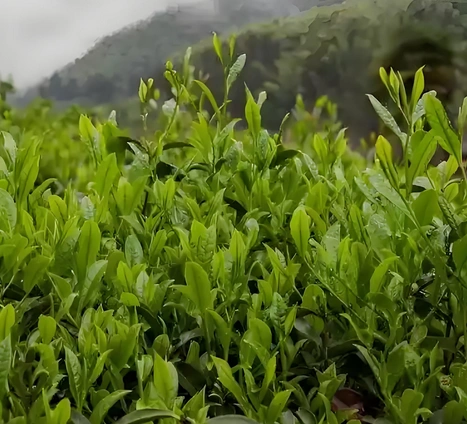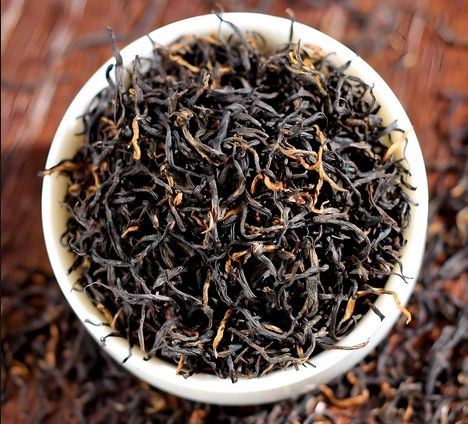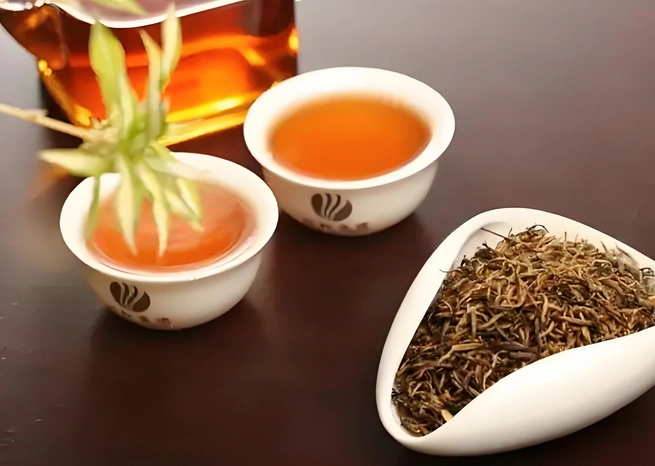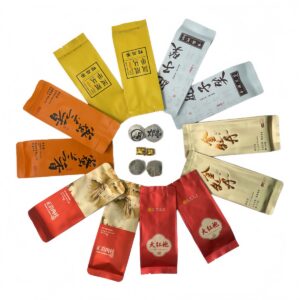Chinese black tea greets you with a warm, amber embrace—its rich aroma of malted barley and honey dancing with whispers of smoke and spice. From the misty slopes of Wuyi to the sunlit valleys of Yunnan, each cup of Chinese black tea is a journey through centuries of craftsmanship. Imagine the gentle swirl of steam carrying earthy notes that soothe your soul, while its robust body awakens your senses.
Whether you crave a cleansing ritual with black tea for detox, a smoother pick-me-up than your usual latte through black tea as coffee alternative, or a midday companion for productivity—black tea for office workers—this guide will unveil the secrets behind China’s most beloved red teas. Prepare to explore its storied past, signature varieties, healthful antioxidants, and expert brewing rituals that transform simple leaves into liquid gold.
What Is Chinese Black Tea?
Chinese black tea, known locally as “hong cha,” undergoes full oxidation, which develops its deep color and pronounced flavor. Unlike green tea’s grassy brightness or oolong’s floral depth, Chinese black tea conveys cozy richness:
- Withering: Fresh leaves are spread to wilt, concentrating sugars.
- Rolling: Gentle bruising breaks cell walls, releasing enzymes.
- Oxidation: Tea masters carefully control humidity and temperature as leaves darken.
- Drying & Firing: Heat halts oxidation, locking in caramelized sugars and aromatic oils.
This meticulous process yields a spectrum of flavors—from smoky and resinous to sweet and fruity—that reflect the terroir of Fujian’s Wuyi Mountains, Anhui’s Keemun hills, and Yunnan’s ancient forests.

Key Health Benefits of Chinese Black Tea Antioxidants
Detox & Cellular Renewal (Black Tea for Detox)
Rich in polyphenols such as theaflavins and thearubigins, Chinese black tea antioxidants act like microscopic guardians, neutralizing harmful free radicals and supporting your body’s natural detox pathways. A daily cup flushes toxins, promotes liver health, and revitalizes your cells—leaving your skin radiant and your spirit renewed.
Metabolism & Energy Boost (Black Tea as Coffee Alternative)
For those seeking a gentler lift than espresso’s jolt, black tea as coffee alternative offers sustained energy. Its moderate caffeine and synergistic L-theanine provide alert focus without the crash. Moreover, catechins stimulate thermogenesis, revving up your metabolism and supporting healthy weight management.
Workplace Wellness (Black Tea for Office Workers)
In the corporate marathon, black tea for office workers becomes an ally. A mid-afternoon cup sharpens concentration, soothes frazzled nerves, and reduces eye strain. The tannins offer a gentle astringency that refreshes both palate and mindset, making busy days feel smoother and more balanced.
Signature Chinese Black Tea Varieties
Lapsang Souchong (Wuyi Smoked Black Tea)
Born on Wuyi’s misty cliffs, Lapsang Souchong is the original smoked black tea. Pinewood smoke imparts a bold, campfire aroma layered over a malty backbone. Each sip evokes hearthside warmth and ancient forest mists—a sensory voyage you won’t soon forget.
Keemun Black Tea (Qimen)
Hailing from Anhui province, Keemun Black Tea charms with its winey fragrance and delicate plum notes. Often called the “Burgundy of teas,” Keemun’s refined sweetness and hint of cocoa make it a favorite for afternoon blends and sophisticated palates.
Yunnan Dianhong (Yunnan Black Tea)
From the birthplace of tea, Yunnan Dianhong dazzles with golden tips and robust body. Its honeyed sweetness and subtle spice reflect the region’s ancient tea trees—making it both an invigorating morning brew and an indulgent dessert tea.
Fujian Golden Tips & Other Regional Styles
- Fujian Golden Tips: Silvery buds roasted to caramel perfection, offering creamy sweetness.
- Guangxi Liubao Tea: Aged brick tea with earthy, mellow character ideal for cool-weather sipping.
- Hubei Enshi Yulu: Subtly floral and bright, bridging green and black teas.

Flavor Profile & Tasting Notes
Chinese black tea unfolds in layers:
- Malt & Caramel: Rich, toasted sweetness lingers like warm toffee.
- Smoke & Spice: Notes of pine, cinnamon, and clove add intrigue.
- Fruit & Floral: Underlying plum, apricot, or orchid hints dance on the finish.
- Earth & Honey: Yunnan teas bring subtle earthiness and honeyed depth.
Terroir—soil minerals, elevation, and microclimate—along with oxidation and roast, work like an artist’s palette to craft each tea’s signature expression.
Caffeine Content & Functional Properties
Black Tea Caffeine Levels
A typical cup contains 40–60 mg caffeine—enough to enhance alertness without jitters. Compared to espresso’s concentrated burst, Chinese black tea offers a smoother crescendo of energy, perfect for sustained focus.
Black Tea as Coffee Alternative
Swap your morning drip for black tea as coffee alternative to reduce acidity and support digestive comfort. Add a splash of milk or a hint of cinnamon to mimic your latte ritual, while enjoying ample antioxidants.
Black Tea for Office Workers’ Focus
Keep a flask of robust Yunnan or brisk Keemun at your desk. Its moderate caffeine keeps you attentive in meetings, while polyphenols help ward off stress-induced oxidative damage—making workdays feel less draining.
Brewing Chinese Black Tea for Maximum Benefits
- Water Temperature: 95–100 °C for fully oxidized leaves.
- Leaf Quantity: 2–3 g per 250 ml of water.
- Steep Time: 3–5 minutes for Western-style; 4–6 seconds over 4–6 steeps in Gongfu-style.
- Western-style: Place leaves in an infuser, pour hot water, steep 4 minutes, and enjoy.
- Gongfu-style: Use a small teapot, quick multi-infusions reveal evolving flavors—first a brisk malty note, then warming spice, then sweet fruit undertones.
For black tea for detox, an extended 5-minute steep extracts potent polyphenols. To savor delicate floral nuances in Keemun, opt for a 3-minute infusion.

🔗 For more tea brewing methods, check out the YouTube video explaining the brewing methods.
Incorporating Chinese Black Tea into Daily Life
- Morning Ritual: Start with Yunnan Dianhong for gentle wakefulness and antioxidant protection.
- Midday Detox: Brew a strong Lapsang Souchong to clear the mind and support liver health.
- Afternoon Focus: Sip Keemun or Fujian Golden Tips to fuel productivity and maintain calm.
- Evening Wind-Down: Choose lighter styles, like Enshi Yulu, to relax without disrupting sleep.
Pair with antioxidant-rich snacks—berries, dark chocolate, or nuts—to amplify health benefits and pleasure.
Selecting & Storing Quality Chinese Black Tea
- Whole-Leaf Integrity: Look for uniform, intact leaves and visible golden tips.
- Aroma Test: Dry tea should exude clear, signature scents—pine smoke for Lapsang, plum for Keemun.
- Origin Labels: Authentic teas display region names and, for premium grades, harvest season.
- Storage Tips: Keep in airtight, opaque containers, in a cool, dry place away from light, moisture, and strong odors. Fresh China black tea retains peak flavor for 6–12 months.
FAQs About Chinese Black Tea
- How strong is Chinese black tea caffeine?
40–60 mg per cup—ideal for steady alertness. - Can black tea replace my morning coffee?
Yes—its moderate caffeine and antioxidants make it a healthier swap. - Which black tea is best for detox?
Lapsang Souchong or a strong Yunnan brew, steeped 4–5 minutes, maximizes polyphenol release.
Conclusion: Embrace Chinese Black Tea
From the smoky heights of Lapsang Souchong to the honeyed valleys of Keemun and Yunnan, Chinese black tea offers an exquisite spectrum of flavors and wellness benefits. Whether you seek black tea for detox, a refined caffeine lift, or black tea for office workers to power through your day, this ancient brew adapts to your needs. Master the art of brewing, explore top varietals, and infuse each moment with the timeless warmth and vitality of China’s red teas. Cheers to your next cup of liquid heritage.



